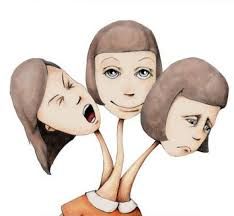Anger
Where Are You When You’re “Beside Yourself”?
Here’s a new—and more revealing—interpretation of being “beside yourself.”
Posted October 15, 2014

from womendiaries.com
The common expression “I was beside myself!” is perhaps one of the most intriguing idioms in the English language. And the mental state—or better, feeling state—it surrealistically refers to bears a peculiar resemblance to the psychotic splitting of schizophrenia. Still, this familiar phrase is hardly to be taken literally.
So where does this figurative expression come from anyway? And what exactly was it designed to depict? The literature on the subject typically traces it back to ancient Greece, where “beside” meant “outside of” or “away from” (cf. the complementary turn of phrase, “carried away by”). To the ancients, experiencing extreme emotion—whether of distress or euphoria—induced a person’s soul to leave the body and actually stand beside them. In fact, their word for ecstasy meant “standing out of the body” (see Dictionary of Word Origins by Jordan Almond, 1998). Consider another common expression, “out of one's mind,” as it relates to a state markedly deviating from a person’s normal consciousness. And note also the negative connotations of such a state—not that dissimilar from another out-of-control expression, “taking leave of one’s senses” (!).
Being at the uppermost limit, or pole, of an emotion—and regardless of what that particular emotion may be—is, then, what being “beside yourself” is all about. It’s as though another person not previously on the scene has just arrived to join, or entirely take over, your being: A suggestion of temporary insanity—if only because the emotion you’re feeling is so highly charged, or excessive, that your rational faculties are held in abeyance (i.e., you’re currently “out of your mind”). So it’s only to be expected that in such an extreme state of feeling, any mental clarity (let alone lucidity) would have evaporated.
It’s crucial to point out that being “beside yourself” is an unusually wide-ranging, all-purpose idiom. For it can refer to almost any emotion at all, as long as in the moment that feeling (another idiom here!) “holds sway” over you. Totally under its influence, it—rather than your reason or common sense—“oversees” or “regulates” your behavior, even though to others your being so overcome with emotion is likely to make them perceive you as not in control at all.
It might be helpful to enumerate some of the emotions, both negative and positive, that have frequently been associated with this familiar idiom. But first it should be emphasized that what links all of these different emotions is that they relate to extreme nervous system arousal—whether it be of agitation (negative) or exhilaration (positive).
So, for example, you might be “beside yourself” (or “out of your mind”) with anxiety, anger, frustration, confusion, fear, worry, rage, grief, sorrow, or depression. Or, you could be “beside yourself” with glee, joy, astonishment, enchantment, awe, or ecstasy (which typically—and secularly—refers to an extraordinarily pleasurable, dopamine-drenching sexual experience). Just compare being “in the pit of despair” with being “in seventh heaven” or “cloud nine.” For in either case, you’d be “beside yourself.”

from discussingdissociation.com
Just as the emotional extremes this idiom reflects seem almost endless, so do its synonyms. Thesaurus.com, for example, lists no fewer than 22 categories of synonyms. And it may be instructive to list all of them (with the understanding that as many as 30-40 overlapping synonyms are included under each category!). Here goes:
- in a panic
- crazy: infatuated, in love
- delirious: excited; very happy
- distraught: very upset, worked-up
- excited: inspired; upset
- frantic: distressed, distracted
- furious: extremely angry, very mad
- hysterical: very upset, excited
- intoxicated: extremely happy
- livid: extremely angry
- on edge: tense
- overwrought: exhausted and excited
- psyched: excited
- pumped: excited
- raging: violent; mad
- solicitous: worried
- tense: under stress, pressure
- uncontrollable: wild; carried away
- worried: anxious, troubled
- wrathful: very angry
- ireful: furious
- madding: frantic (including such colloquial expressions as “at wit’s end,” “weirded out,” “wigged out,” “worked up,” “zonkers” (!), “flipped out,” “freaked out,” “hot and bothered,” “in a tizzy,” “shook up,” “spazzed out,” and “unglued.” (Whew!)
No antonyms are provided for “beside myself,” but if they were they’d probably be grouped under such headings as calm, composed, cool and collected, sensible, serene, unruffled, self-possessed (vs. possessed by!), unperturbed, and dispassionate—not to mention such vernacular phrases as “cool as a cucumber” and “keeping a stiff upper lip” (i.e., not betraying one’s emotions—vs. flagrantly, or involuntarily, exhibiting them).
In fact, on an “emotional magnitude” scale of 0 to 10, “beside oneself” surely equals a 10—or perhaps an 11(!). For it’s a feeling state so far beyond a normal curve that it’s “outside” (or “beside”) it. That’s why, for instance, being “beside yourself with grief” suggests an almost suicidal state of despondency, and being “beside yourself with rage” the possibility of acting out the most extreme violence or aggression. After all, in both states your behavior is in danger of getting terribly, irretrievably, out of control. So fervently overcome with emotion, you may no longer be able to think clearly or act rationally. And you’ve probably had moments in your life when your feelings were so intense that your better judgment was simply inaccessible.
So, to conclude, exactly who is it that suddenly makes his/her appearance when you’re beside yourself? Sure, this individual might feel like some foreign entity manifesting itself beside—or in—you. But is this “other self” really anything other than an inherent (though recessive) part of your being? And here I’d like to offer an explanation that I’ve yet to see advanced in any of the literature on this topic. (And that includes Wikipedia, which probably contains one of the most elaborate discussions of this fascinating idiom.)
But first let me ask you to ponder some questions: What’s the part of you that’s most easily governed by emotion?—most likely to feel overwhelmed? provoked? agitated? enraged? helpless? grief-stricken? terrified? devastated? or confused? Or, contrariwise, surprised? excited? exuberant? delighted? or even ecstatic?

from sanctuairesoulssanctuary.com
To respond to my own query, I think the answer is fairly obvious: It’s your child part. The part of you most susceptible to being “flooded” with emotion. The part not yet capable of summoning the cognitive resources necessary to cope thoughtfully with unanticipated situations and events. The part most likely to react not reflectively but impulsively. The part that lacks the capacity to consider the immediate circumstance from various vantage points. For without the ability to undertake such rational analysis, appropriately responding to here-and-now provocations is simply impossible.
So when you’re enraged, might you not be descending (or rather, regressing?) into a full-fledged temper tantrum, similar to a hyper-emotional two-year-old? Or if you’re beset with grief because your lifetime partner has just died (or maybe divorced you), might you not be reacting like a highly dependent child feeling abandoned by their main “attachment figure”? In short, when you’re feeling beside yourself, your inner child (whether recognizable or not) has emerged almost as a separate physical entity, obliterating your higher thought processes, which in the moment are no longer available.

from www.sodahead.com
So whenever you’re feeling out of control with your feelings, consider whether your emotional child self—who can’t help but think in absolutes—isn’t in fact “commandeering” your adult being. And, if you can, take a few deep breaths, relocate your more mature, logical, emotionally constrained self, and then compassionately inform your now outer child that what just happened isn’t really as catastrophic as it “feels.”
But—I should add—if it’s great pleasure, excitement, or feelings of bliss that have temporarily taken you over, go ahead and let your thrilled, enthralled child lead the way. (Just be careful about hugging strangers!)
Note: If you found this post interesting, I hope you’ll pass on its link. Moreover, if you’d like to check out other posts I’ve done for Psychology Today—on a broad range of topics—click here.
© 2014 Leon F. Seltzer, Ph.D. All Rights Reserved.
--- I invite readers to join me on Facebook, and to follow my sometimes unorthodox musings on Twitter.




